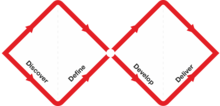Double Diamond (design process model)
Appearance

Double Diamond is the name of a design process model popularized by the British Design Council in 2005.[1] The process was adapted from the divergence-convergence model proposed in 1996 by Hungarian-American linguist Béla H. Bánáthy.[2][3] The two diamonds represent a process of exploring an issue more widely or deeply (divergent thinking) and then taking focused action (convergent thinking).[4] It suggests that the design process should have four phases:
- Discover: Understand the issue rather than merely assuming what it is. This phase involves speaking to and spending time with people who are affected by the issues.
- Define: With insight gathered from the discovery phase, define the challenge in a different way.
- Develop: Give different answers to the clearly defined problem, seeking inspiration from elsewhere and co-designing with a range of different people.
- Deliver: Test different solutions at a small scale. Reject those that will not work and improve the ones that will.[4]
To celebrate 20 years of the Double Diamond in 2023, the Design Council released a visual representation under an open license and created a Mural template.[5][6]
References
[edit]- ^ "Eleven lessons. A study of the design process" (PDF). Design Council. Retrieved 2 December 2022.
- ^ Banathy, Bela H. (1996). Designing Social Systems in a Changing World. Springer US. p. XV, 372. ISBN 978-0-306-45251-2.
- ^ Möller, Ola (9 January 2015). "The Double Diamond". MethodKit Stories. Archived from the original on 21 December 2022. Retrieved 3 September 2019.
- ^ a b "What is the framework for innovation? Design Council's evolved Double Diamond". Design Council. Archived from the original on 26 September 2019. Retrieved 6 April 2021.
- ^ "From humble beginnings to a cornerstone of design language". Design Council. Archived from the original on 11 May 2023. Retrieved 11 May 2023.
- ^ "Double Diamond template". Mural.co. Retrieved 11 May 2023.
